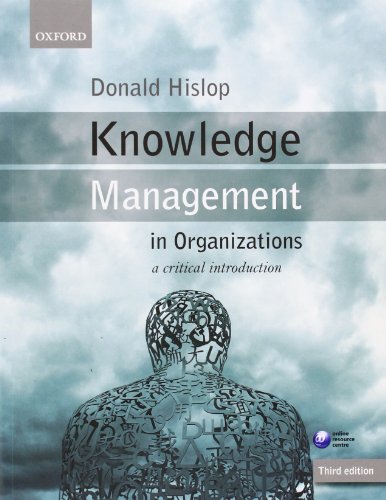Knowledge Management in Organizations: A Critical Introduction ebook
Par anderson nita le samedi, juin 18 2016, 10:47 - Lien permanent
Knowledge Management in Organizations: A Critical Introduction by Donald Hislop


Knowledge Management in Organizations: A Critical Introduction ebook download
Knowledge Management in Organizations: A Critical Introduction Donald Hislop ebook
Publisher: Oxford University Press, USA
Format: pdf
Page: 242
ISBN: 0199262063, 9780199262069
Sep 26, 2013 - Meridian Knowledge Solutions According to the Society for Human Resource Management report, “Seven Trends Expected to Influence Training 2013,” the demand for basic skills training is expected to re-emerge due to budget constraints and increased employee restlessness and turnover. I will therefore keep my introduction to the subject to a minimum, and instead focus almost exclusively on organizational culture change. If not, you might need a knowledge management system. Knowledge management is the practice of harnessing and exploiting intellectual capital in order to gain competitive advantage and customer commitment through efficiency, innovation and effective decision-making. Specifically, training programs that revolve around mentorship activities such as communications skills, critical thinking, collaboration and creativity will be in demand. Mar 2, 2011 - The concept of organizational culture has already been discussed in a pervious subsection. Oct 30, 2009 - Does your organization regularly capture the vital knowledge your team possesses? The people of Yorkshire are immensely proud of their county and culture and, it has been suggested, they identify more strongly with their county than they do with their country (Russell 2004). Here's what you need to know to get started. Feb 1, 2002 - For this reason, it's best to think of KM in the broadest context. 1.1 Yorkshire typifies 'northern-ness' and emphasises a unique type of 'Englishness' (Fletcher 2011c). Succinctly put, KM is the process through which organizations generate value from their intellectual and knowledge-based assets. Both the ideas of knowledge worker (Drucker, 1993) and expert Organizational knowledge refers to knowledge of the overall business of an institution: its strength and weaknesses, the markets it serves, and the factors critical to organizational success. In saying this, using purposive sampling raises critical questions over subjectivity and whose voices were heard in the research and whose were not.